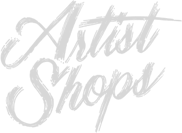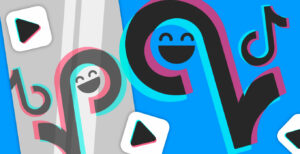“Disabled” is not a bad word. It’s a badge of honor, according to Erin Noon Kay, CEO and Founder of Claiming Disability LLC. As an entrepreneur with cerebral palsy, she empowers the disabled community and spreads the message that it’s okay to look disabled. How exactly? By helping to increase the visibility of disabled people in everyday culture.
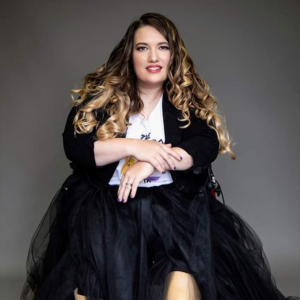
With Erin leading the way, Claiming Disability LLC creates disability-related content and outreach activities that embrace and celebrate the disabled community. Their media projects include the Claiming Disability Podcast, where Erin interviews disabled celebrities. She also makes TikTok videos that spread awareness and understanding of issues that impact disabled people.
Claiming Disability LLC also delivers messages of empowerment and inclusion through its Threadless Artist Shop. There, you’ll find apparel, accessories, and home decor with powerful statements such as “Pay Disabled Content Creators.”
We caught up with Erin to talk about Claiming Disability LLC, common obstacles disabled creators face, and ways able-bodied people can support her company’s mission.
You describe yourself as a fierce disabled entrepreneurial woman. Talk to us about the meaning of Disability Pride.
Erin Noon Kay: People have a tendency to view disability in a negative lens and context, but having a disability doesn’t have to be a bad thing. Disability Pride is a relatively new concept in the disabled community, but it’s understanding that having a disability isn’t negative and the negative effects we experience as disabled people is due to inaccessibility and lack of access, not the disabled person. My hashtag #PrettyDisabledPowerful (tee available on Threadless) says disabled people are pretty, powerful, and disabled. None of those words are negative, but all empowering.
Disability Pride advocates are working hard to change the disabled narrative and the disabled community to embrace themselves. Every other marginalized group of people is allowed to feel love with their bodies except disabled people. I’d like to think my brand is changing that narrative through Threadless.
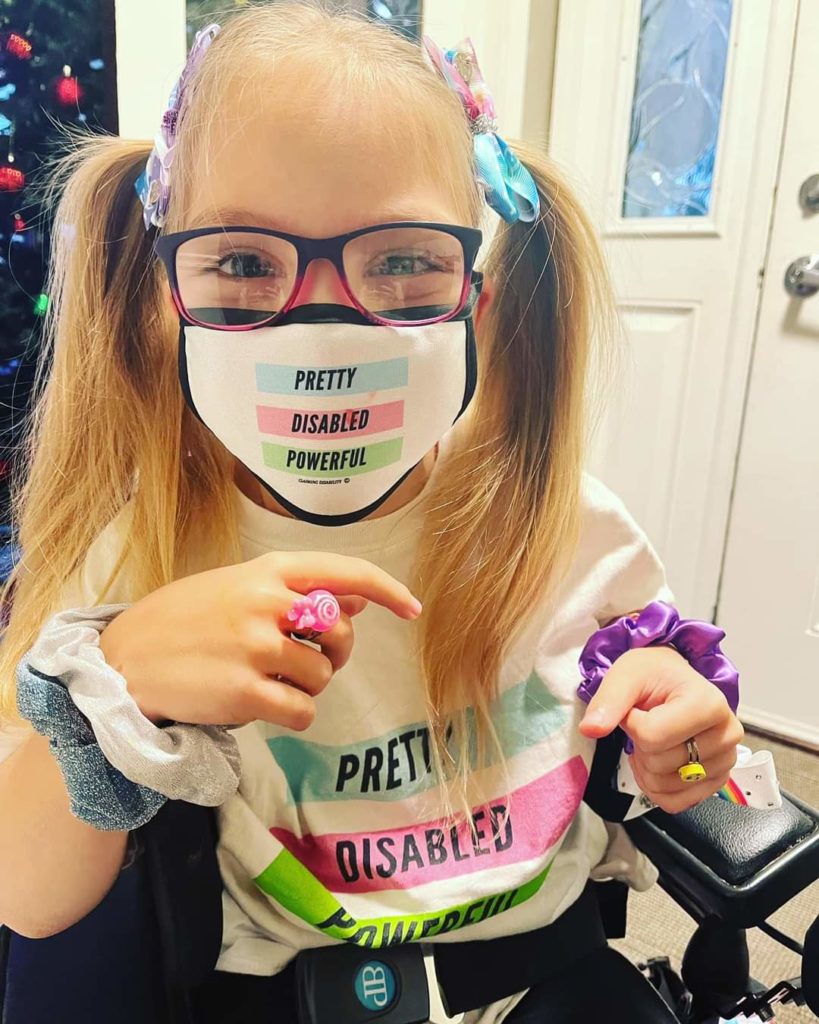
What is the mission of Claiming Disability LLC and how does it advocate for the disabled community?
ENK: Claiming Disability LLC works to educate, advocate, and empower the disabled community through media projects like the Claiming Disability LLC podcast available on Spotify, iTunes, etc. Claiming Disability, LLC is connected to over 4,000 disability advocates from around the world, including Jim Lebrecht and Nicole Newnham, the Directors/Executive Producers of Crip Camp. [In the documentary] a groundbreaking summer camp galvanizes a group of teens with disabilities to help build a movement, forging a new path toward greater equality.
Claiming Disability LLC wants to spread our messages of empowerment and compassion. We believe that a single action can make a difference in the community, and that shared experiences can greatly impact inclusion. Through advocacy and outreach activities, our team and our community of supporters works to embrace diversity and disability as an asset toward the greater good.
What are some of the challenges people with disabilities face while seeking employment, especially during the ongoing pandemic?
ENK: Disabled people make up 17.9% of the overall workforce population, which has decreased from 19% from 2019 to 2022. The disabled community continues to struggle for viable employment opportunities because of workplaces’ inability to provide virtual opportunities and look for diverse groups of people with diverse backgrounds and experiences.
Disabled advocates have been fighting for remote access for many years. After COVID-19 hit, all of sudden disabled people worldwide had access like never before. It concerns me when we discuss returning to in-person [work] when that’s not an accessible option to all. Disabled people bring a wealth of experience to the workplace, but are constantly overlooked and discriminated against. So, many disabled people like myself pursue entrepreneurial opportunities.
Are there any sources of passive income you would suggest for people having difficulty finding employment?
ENK: Definitely. I would recommend starting a Threadless Artist Shop and pursuing remote opportunities.
What advice can you give disabled people who aspire to be an entrepreneur like yourself?
ENK: Stop caring what people think of you. People aren’t as supportive of small businesses as one would think. I think because entrepreneurs go against the norm. You must be persistent and optimistic that the right followers and supporters will gravitate towards your brand. Many social media platforms are highlighting “niche” culture like Disability Pride.
How can clothing brands and online retailers better accommodate the disabled community?
ENK: First and foremost, include the disabled community in branding and marketing campaigns, and hire disabled people when creating campaigns. I do consultation for many corporations and businesses as a disabled advocate on how to be a more effective, inclusive brand. Disability Pride and culture makes sense to disabled people. We have our hashtags, our own accessibility requirements, closed captioning, image descriptions, etc.
Disability is a culture. Having a disabled employee could be a huge advantage to your organization to reach new customers and clients. Often when we are discussing marginalized groups in HR settings, the disabled community is forgotten.
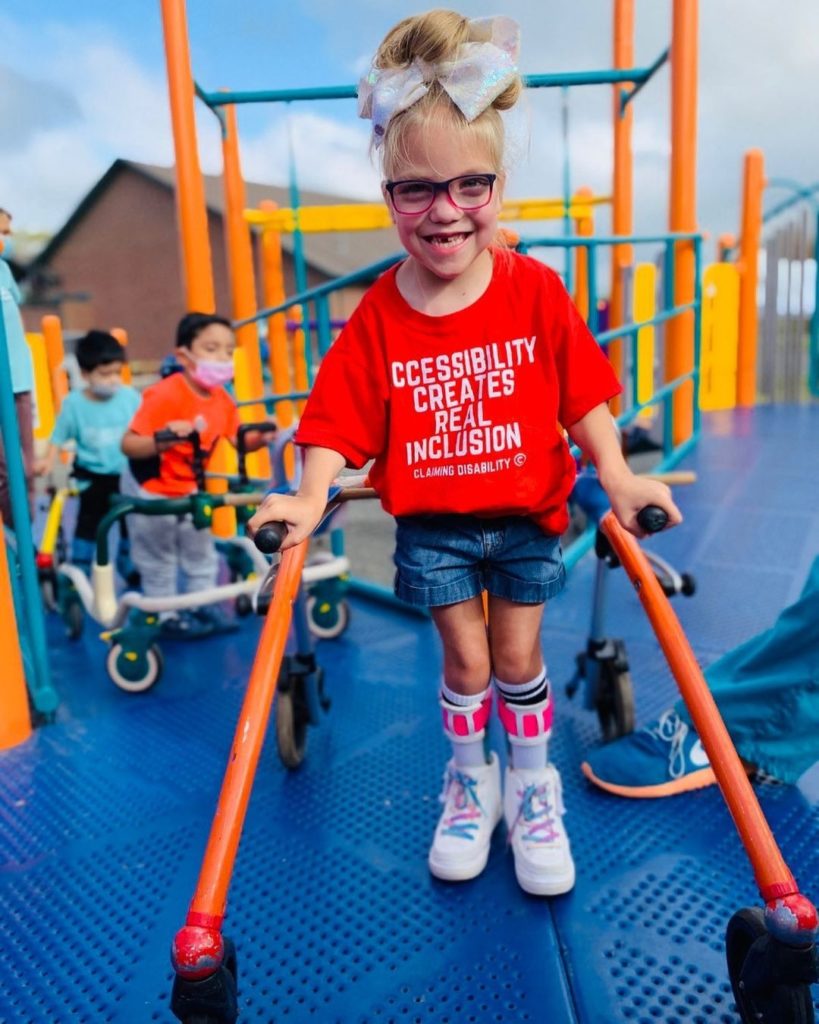
How can apparel be more accessible to people with disabilities? Are there any particular features you look for in a garment?
ENK: Please consult brands that do adaptive fashion like Patti and Ricky—there are many. Accessibility is often broken down by ability to be accessible to everyone. Disabled people can have fabric allergies or need a garment that they can put on without assistance. Disabled people are looking for comfort, flexibility, and affordability.
Language can be tricky when it comes to expressing support for underrepresented communities. What words and terminology should Threadless artists familiarize themselves with if they want to cater to people with disabilities? Are there any useful resources they can reference?
ENK: In the disabled community we discuss identity-first language (disabled person) and person-first language (people with disabilities), often sometimes to excess, in my opinion…Disabled people are part of a unique community and culture. Our identifiers define us. A disabled person using “disabled” or “person with disabilities” is a matter of autonomy. As disabled people, we always don’t have control over things. Ableism is built into the fabric society, discrimination, poverty, even our own bodies.
Disabled identifiers are about choice. I choose to identify as a “disabled and proud” human being because it liberates me. Reclamation language or “identity first” is the idea of “reclaiming disability pride and culture.” Being disabled isn’t bad, it’s just part of the human experience.
Best resources on disabled language: Imani Barbarin’s website, Crutches and Spice; Emily Ladau’s book, Demystifying Disability; Andrew Gurza; and Stella Young’s 2014 TED talk.
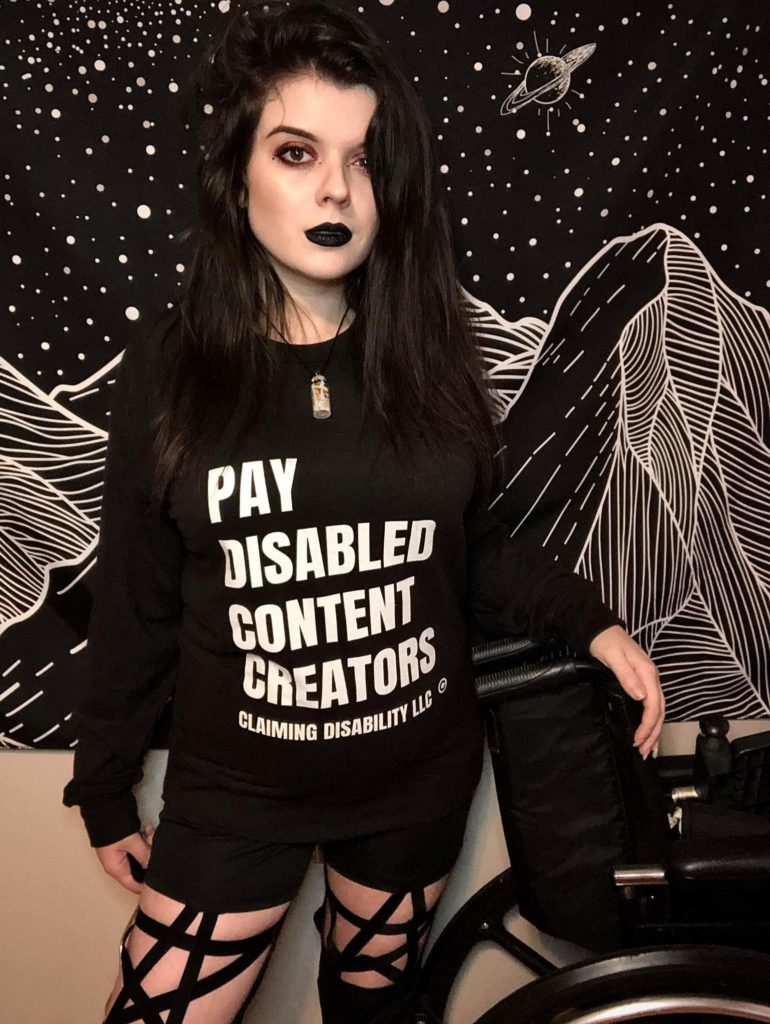
How can able-bodied shop owners show their support, be an ally, and advocate for the disabled community in a meaningful way?
ENK: I get asked a lot if able-bodied people can support my brand. The answer is “of course.” One of my biggest designs is “Pay Disabled Content Creators” (pictured). [The overall message is to] pay disabled people. Our services are valuable.
Often, I’m asked if my business is nonprofit. It’s definitely not, and that’s intentional. Disabled people deserve to be paid and supported. I’ve created designs for able-bodied people and disabled people, so there’s really something for everyone. Disabled people live in poverty due to the systems we are tied to, like Medicaid and SSI, so supporting disabled content creators is critical.
How can artists get involved with Claiming Disability LLC?
ENK: Of course, you can visit Claiming Disability LLC at https://allmylinks.com/erin-noon.
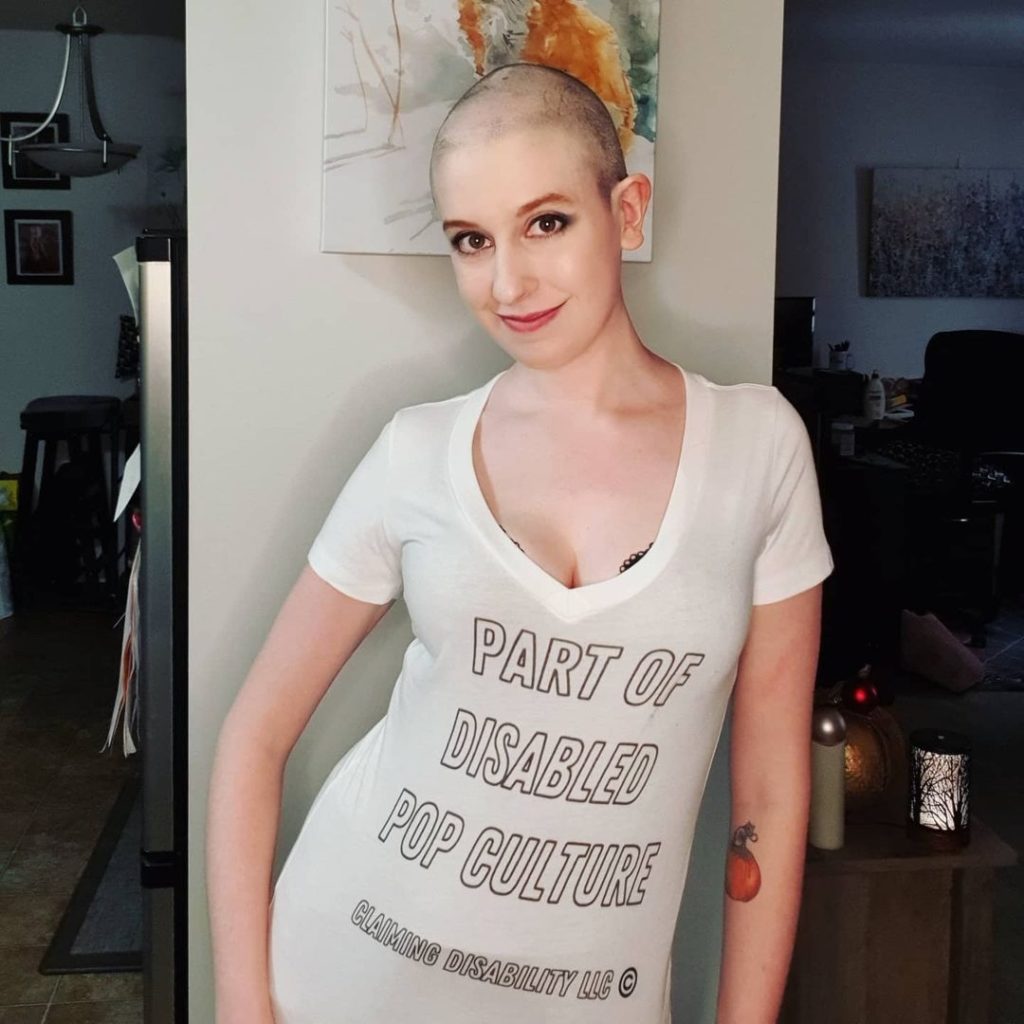
Thank you to Erin Noon Kay for this illuminating conversation! Follow Erin on social media to keep up with all the exciting things Claiming Disability LLC has in store.
Claiming Disability LLC’s Threadless Artist Shop is a great example of how artists, content creators, and organizations can use merchandise to spread messages of empowerment and inclusion. If you’re a creator with something important to say, it only takes minutes to build an Artist Shop and start selling merch that promotes your mission.
